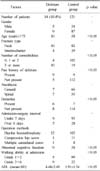Abstract
Purpose
To find out the relationship between various risk factors and post-operative delirium in elderly patients with hip fractures.
Materials and Methods
Out of 135 patients older than 65 years old who underwent the surgery for hip fracture in our department, between the periods of March 2003 to March 2005, 14 patients (10.4%) developed post-operative delirium and 121 patients (89.6%) did not. We studied risk factors of post-operative delirium in two groups.
Results
In chi-square test between delirium group and non-delirium group, the patients were more likely to develop post-operative delirium if they had previous episodes of delirium, abnormal cognitive function, low walking ability before admission, high dependency on ADL (Activities of Daily Living), other medical accompanying diseases, history of dementia, post-operative hypoxia, post-operative electrolyte imbalance, low post-operative hemoglobin and hematocrit, low post-operative albumin and were older than 75 years old (p<0.05). Sex, type of fracture, anesthesia and the time between admission and operation did not show much difference between the two groups.
Conclusion
The risk factors of postoperative delirium in elderly patients with hip fracture have a tendency to be multifactorial. Therefore, we conclude that being prepared by thorough understanding of the risk factors and their relationships will help prevent post-operative delirium and result in good postoperative prognosis.
Figures and Tables
References
1. Bedford PD. Adverse cerebral effects of anesthesia on old people. Lancet. 1955; 269:259–263.
2. Berggren D, Gustafson Y, Eriksson B, et al. Postoperative confusion after anesthesia in elderly patients with femoral neck fractures. Anesth Analg. 1987; 66:497–504.

3. Brännström B, Gustafson Y, Norberg A, Winblad B. Problems of basic nursing care in acutely confused and non-confused patients. Scand J Caring Sci. 1989; 3:27–34.

4. Campion EW, Jette AM, Cleary PD, Harris BA. Hip fracture: a prospective study of hospital course, complications, and costs. J Gen Intern Med. 1987; 2:78–82.
5. Clayer M, Bruckner J. Occult hypoxia after femoral neck fracture and elective hip surgery. Clin Orthp Relat Res. 2000; (370):265–271.

6. Edelstein DM, Aharonoff GB, Karp A, Capla EL, Zuckerman JD, Koval KJ. Effect of postoperative delirium on outcome after hip fracture. Clin Orthop Relat Res. 2004; 422:195–200.

7. Edlund A, Lundström M, Brännström B, Bucht G, Gustafson Y. Delirium before and after operation for femoral neck fracture. J Am Geriatr Soc. 2001; 49:1335–1340.

8. Francis J, Martin D, Kapoor WN. A prospective study of delirium in the hospitalized elderly. JAMA. 1990; 263:1097–1101.

9. Gustafson Y, Berggren D, Brännström B, et al. Acute confusional states in elderly patients treated for femoral neck fracture. J Am Geriatr Soc. 1988; 36:525–530.

10. Gustafson Y, Brännström B, Berggren D, et al. A geriatric-anesthesiologic program to reduce confusional states in the elderly patients treated for femoral neck fractures. J Am Geriatr Soc. 1991; 39:655–662.

11. Gustafson Y, Brännström B, Norberg A, Bucht G, Winblad B. Underdiagnosis and poor documentation of acute confusional states in elderly hip fracture patients. J Am Geriatr Soc. 1991; 39:760–765.

12. Inouye SK, Charpentier PA. Precipitating factors for delirium in hospitalized elderly persons. Predictive model and interrelationship with baseline vulnerability. JAMA. 1996; 275:852–857.

13. Inouye SK, Rushing JT, Foreman MD, Palmer RM, Pompei P. Does delirium contribute to poor hospital outcomes? A three-site epidemiological study. J Gen Intern Med. 1998; 13:234–242.
14. Inouye SK, van Dyck CH, Alessi CA, Balkin S, Siegal AP, Horwitz RI. Clarifying confusion: the confusion assessment method. A new method for detection of delirium. Ann Intern Med. 1990; 113:941–948.

15. Jitapunkul S, Pillay I, Ebrahim S. Delirium in newly admitted elderly patients: a prospective study. Q J Med. 1992; 83:307–314.
16. Kagansky N, Rimon E, Naor S, Dvornikov E, Cojocaru L, Levy S. Low incidence of delirium in very old patients after surgery for hip fractures. Am J Geriatr Psychiatry. 2004; 12:306–314.

17. Kawaguchi Y, Kasanori M, Ishihara H, et al. Postoperative delirium in spine surgery. Spine J. 2006; 6:164–169.

18. Levkoff SE, Evans DA, Liptzin B, et al. Delirium. The occurrence and persistence of symptoms among elderly hospitalized patients. Arch Intern Med. 1992; 152:334–340.

19. Lipowski ZJ. Delirium: acute confusional state. New York: Oxford University Press;1990. p. 442–478.
20. Lundström M, Edlund A, Bucht G, Karlsson S, Gustafson Y. Dementia after delirium in patients with femoral neck fractures. J Am Geriatr Soc. 2003; 51:1002–1006.

21. Marcantonio ER, Flacker JM, Wright RJ, Resnick NM. Reducing delirium after hip fracture: a randomized trial. J Am Geriatr Soc. 2001; 49:516–522.

22. Marcantonio ER, Goldman L, Orav EJ, Cook EF, Lee TH. The association of intraoperative factors with the development of postoperative delirium. Am J Med. 1998; 105:380–384.

23. Mullen JO, Mullen NL. Hip fracture mortality. A prospective, multifactorial study to predict and minimize death risk. Clin Orthop Relat Res. 1992; 280:214–222.
24. O'Brien LA, Grisso JA, Maislin G, Chiu GY, Evans L. Hospitalised elders. Risk of confusion with hip fracture. J Gerontol Nurs. 1993; 19:25–31.
25. Ochs M. Surgical management of the hip in the elderly patient. Clin Geriatr Med. 1990; 6:571–587.

26. O'Keeffe ST, Ni Chonchubhair A. Postoperative delirium in the elderly. Br J Anaesth. 1994; 73:673–687.
27. Olofsson B, Lundström M, Borssen B, Nyberg L, Gustafson Y. Delirium is associated with poor rehabilitation outcome in elderly patients treated for femoral neck fractures. Scand J Caring Sci. 2005; 19:119–127.

28. Potter JF. The older orthopaedic patient: general considerations. Clin Orthop Relat Res. 2004; 425:44–49.
29. Robertson BD, Robertson TJ. Postoperative delirium after hip fracture. J Bone Joint Surg Am. 2006; 88:2060–2068.

30. Rockwood K, Cosway S, Carver D, Jarrett P, Standnyk K, Fish J. The risk of dementia and death after delirium. Age Ageing. 1999; 28:551–556.

31. Rogers MP, Liang MH, Daltroy LH, et al. Delirium after elective orthpedic surgery: risk factors and natural history. Int J Psychiatry Med. 1989; 19:109–121.

32. Schuurmans MJ, Duursma SA, Shortridge-Bagget LM, Clevers GJ, Pel-Little R. Elderly patients with a hip fracture: the risk for delirium. Appl Nurs Res. 2003; 16:75–84.





 PDF
PDF ePub
ePub Citation
Citation Print
Print





 XML Download
XML Download